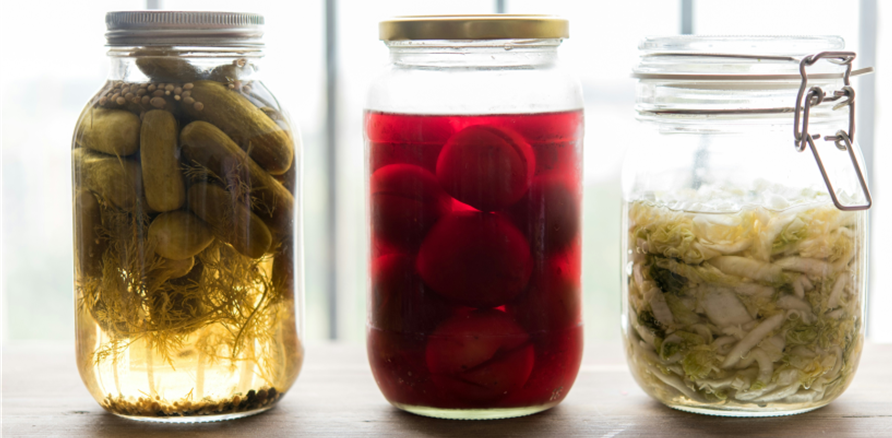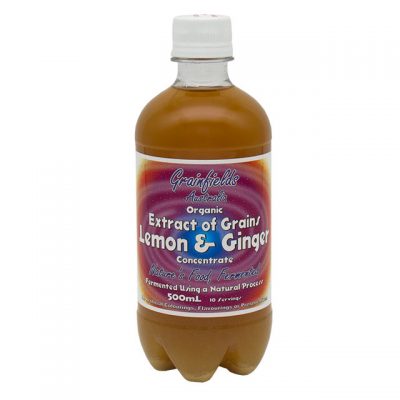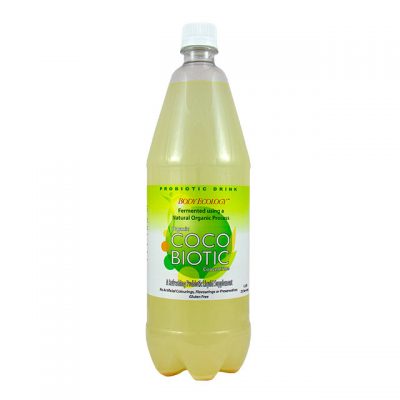Home fermentation has been around for centuries in many cultures throughout history. It was a way of preserving plant foods from surplus produce long before refrigeration was invented.
It was only later that researchers began to discover that fermented foods have so many amazing health benefits.
The gut microbiome can be depleted by many factors including the effects of antibiotics, bad diet, illness, ageing and stress. The fermentation of plant-based foods produces beneficial bacteria which helps to restore and maintain the balance of good flora in the gut. (1) Fermented foods contribute to efficient digestion by providing enzymes to aid in the pre-digestion of proteins and synthesis of vitamins. (1, 2)
Fermentation of foods helps break down and destroy antinutrients that interfere with nutrient absorption – such as phytates and lectins which are found in seeds, nuts, grains and legumes. (3)
Research suggests that regular consumption of fermented foods containing beneficial bacteria may boost the immune system, helping to reduce infections such as the common cold and aid quicker recovery from sickness. (4, 5)
Some studies have linked the beneficial bacteria in fermented foods to a reduction in symptoms of anxiety and depression due to the gut brain axis. (6) Because gut bacteria effect brain health, the gut is often referred to as the second brain by researchers. When the gut microbiome is healthy and contains the right balance of good flora, it is able to help balance our emotional wellbeing.
With all these sciences backed benefits, it’s easy to see why fermented foods have had such a revival and become so popular in recent years.
Sources: (1) HASAN, M. N.; SULTAN, M. Z.; MAR-E-UM, M. Significance of Fermented Food in Nutrition and Food Science. Journal of Scientific Research, [S.l.], v. 6, n. 2, p. 373-386, apr. 2014. ISSN 2070-0245.
(2) Şanlier N, Gökcen BB, Sezgin AC. Health benefits of fermented foods. Crit Rev Food Sci Nutr. 2019;59(3):506-527. doi: 10.1080/10408398.2017.1383355. Epub 2017 Oct 20. PMID: 28945458.
(3) N.R. Reddy, M.D. Pierson, Reduction in antinutritional and toxic components in plant foods by fermentation, Food Research International, Volume 27, Issue 3, 1994 Pages 281-290, ISSN 0963-9969,
(4) Hannah C. Wastyk, Gabriela K. Fragiadakis, Dalia Perelman, Dylan Dahan, Bryan D. Merrill, Feiqiao B. Yu, Madeline Topf, Carlos G. Gonzalez, William Van Treuren, Shuo Han, Jennifer L. Robinson, Joshua E. Elias, Erica D. Sonnenburg, Christopher D. Gardner, Justin L. Sonnenburg, Gut-microbiota-targeted diets modulate human immune status, Cell,Volume 184, Issue 16, 2021, Pages 4137-4153.e14,
(5) King S, Glanville J, Sanders ME, Fitzgerald A, Varley D. Effectiveness of probiotics on the duration of illness in healthy children and adults who develop common acute respiratory infectious conditions: a systematic review and meta-analysis. Br J Nutr. 2014 Jul 14;112(1):41-54. doi: 10.1017/S0007114514000075. Epub 2014 Apr 29. PMID: 24780623; PMCID: PMC4054664.
(6) Li Y, Hao Y, Fan F, Zhang B. The Role of Microbiome in Insomnia, Circadian Disturbance and Depression. Front Psychiatry. 2018 Dec 5;9:669. doi: 10.3389/fpsyt.2018.00669. PMID: 30568608; PMCID: PMC6290721.





